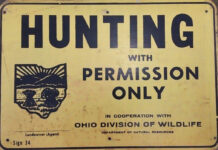A drive through central Illinois one sunny, dry day last week featured miles of black earth, dozens of fast-moving tractors pulling wide, dust-chasing corn planters and soybean drills and not one flatbed wagon or two-wheel trailer holding that day’s seed, fertilizer or fuel.
The reason for those missing links is that, unlike the days of my farming youth, those links aren’t missed.
This year’s fertilizer was put down last year and today’s tractors, planters and drills hold enough fuel and seed to lay a swath of corn or beans from here to tomorrow.
Back in the day
Not so on the southern Illinois farm of my father and his wonderful Uncle Honey. In fact, back then backs seemed to move more farm inputs and outputs than all our tractors, wagons, augers and combines combined.
One story illustrates the essential logic of our farm’s logistics.
Once, as I was carrying buckets of water to calves 100 or so yards from our house, a twice daily chore, I asked my father why we didn’t bury a water line to the calf barn.
“Why do that,” he offered in his perpetually calm, measured voice, “when all I have to do is say, ‘Alan, water the calves’ and off you go for the buckets?”
Huh. The only thing simpler than his answer was me.
Tote that bag
For many years, that same scheme applied to our handling of all the soybean meal used in our dairy feed rations. Since we owned a Mix-Mill — a long ago brand for small, farm-based feed-making — we mixed soy meal with corn to grind (OK, automatically grind) feed every day.
The meal, however, arrived by rail boxcar 12 miles away. In burlap sacks.
Bulging, 90-pound burlap sacks.
That meant that on the big soybean meal day, every able-bodied man, boy and dog traveled to the rail siding with tractors, hay wagons and dread to drag, tote and pack those monstrously heavy sacks for a slow ride to the farm.
Back at the dairy, of course, each was grappled — by one man or two boys — again to the edge of the wagon to be opened and dumped into an auger that moved the meal to a (maybe) 10-ton self-unloading bin that held it for later use.
During one of those sweat-soaked sessions, I asked by father why everyone had their bean meal delivered by truck and we wrestled sacks the size of Rhode Island.
Again the answer was short, clear and sensible: “It’s cheaper this way.”
Then he added the universal German Lutheran explanation for all the unnecessary sweat generated by farm folks since the Garden of Eden, “Besides, it doesn’t kill us.”
Really? That’s a reason?
Ah, yes, hay season
Hay season, of course, was the big back-breaker each year. We, however, doubled-down some of those hot, dusty summer weeks by also baling straw and emptying grain bins of the previous year’s harvest.
Wheat straw was cotton candy compared to alfalfa hay, but emptying a grain bin in mid-June was a half-day sentence in hell. Since the used (of course) 2,200-bushel government bins required us to shovel more than 1,000 bushels to empty it, nothing on the farm was hotter, dirtier or noisier than that awful job.
My father, no slack in him, usually handled one of the two scoop shovels required to keep the bin auger full.
“Come on,” he often urged me or one of my brothers, “it won’t kill you.”
I thought about his simple forecast for pending hard work last October as I packed 35 bags of concrete mix down two sets of steep stairs to a building project. Each bag seemed heavier than the one before and every step back up the stairs was.
But it didn’t kill me.













